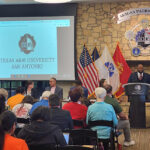
By Melody Mendoza
Seven percent of students voted on the $40 recreational fee for fall and spring terms and $20 fee for summer terms. The vote showed that 51 percent opposed.
Administrators say it was a good turnout considering the status of the University, meaning a start-up member of the Texas A&M System.
“I think since it’s our first attempt, the turnout was good,” said Laura Pantano, assistant vice president of student engagement and success, “However, I would have liked to see more students.”
Most schools receive about a 10 percent voter turnout, Pantano said, adding that “We weren’t far behind.”
Kenneth Mitts, vice president for finance and administration, also said the turnout was good, but said he would have liked to see more students vote.
The fee was recommended on Feb. 13 by the student fee advisory committee, which is comprised of five students and four employees who meet annually in the spring. The committee discussion included funding intramurals or club sports such as soccer, basketball and softball.
Results
- 329 votes were cast
- 63 were invalid — 31 did not include a student ID number, 30 were duplicate votes and two students were not enrolled
- Therefore, 266 votes were counted as valid — 137 or 51 percent opposed and 129 or 49 percent were in support
Justin Limon, kinesiology senior and Kinesiology Club president, said on behalf of the club: “We all feel that it wasn’t promoted properly and there was a lack of information.”
Limon said he didn’t think students understood what services or programs would result from the fee, noting that students only saw an increased fee.
Pantano offered a similar assessment.
She said students saw how the fee would impact them today or in the next year but did not see how the fee would affect student life in the future. She added that the fee would fund club sports now and in the future, the University would be eligible to begin National Collegiate Athletic Association or NCAA programs.
The recreational fee was announced publicly during the three public hearings held over a two-day period March 7 and March 8 at Main Campus Building and Brooks City-Base Campus. At the public hearings, tuition and the consolidation of fees were also discussed.
According to the public hearing minutes provided by Mitts, four staff members and four students attended the March 7 hearing at Main Campus; two staff members and three students attended the March 8 hearing at Main Campus; and two staff members, two students and one faculty member attended the March 8 hearing at Brooks Campus.
The office of student engagement and success sent a flier March 26 — two days before voting — to students via jaguar email, which is one of the main avenues used to communicate with students. Voting was open March 28-29 via SurveyMonkey.
She said students who don’t utilize the jaguar email account are missing out on opportunities to get involved on campus. She said it also may affect a student’s success.
Pantano noted a recent finding of delayed emails. She said there has been an issue with the University server causing some students to receive emails right away and some to receive delayed emails of up to 48 hours.
Ravi Kallianpur, director of information services of information technology, said he had not heard of the issue. He said he would look into the issue to specify if it is a technology problem, an issue in the work flow or timing. He said it could be a number of issues, but said he doesn’t have the full details and needed time to find a resolution.
The recreational fee referendum was previously intended to be added to this spring’s Student Government Association ballot, but SGA elections were postponed until the fall.
Pantano said SGA was previously responsible for the referendum and its advertisement, but because of a lack of manpower, said the responsibility was shifted over to her at the last minute.
She announced the referendum at the President’s Leadership Council meeting March 23 where she encouraged faculty to tell students.
Pantano said she was up against a hard deadline, and didn’t think her office would have had time for a re-vote if they were allowed the option. The deadline for the finalization of the referendum was March 30.
The fee opposition means the delay of funded intramural athletics at A&M-San Antonio.
According to the Texas Education Code, the student fee advisory committee can recommend the recreational fee every two years. Therefore, the committee can revisit the fee in 2014.
Limon said the delay is a big concern, not just for the Kinesiology Club but for the University’s growth.
He said competing athletically with other universities will spark students’ interest in this University and could impact student enrollment.
Pantano said the fee would have offset the cost to fund club sports so that the University wouldn’t have to devote a mass amount of funding into NCAA programs.
Mitts also said there will be a delay because of the limited amount of current resources, which will impact a sports program in the next academic year.
In recent budgetary presentations, Mitts has explained that the Legislature cut about $4.8 million from the University budget and denied a request of $70 million for the building of additional facilities. Although the University was denied funding from the Legislature, the Texas A&M System Board of Regents approved two new buildings — Central Academic Building and the Patriot’s Casa, a stand-alone building dedicated to serving the University’s military student community. Read related story.
Mitts explained that because there will not be funding for an official program, the office of student affairs would be responsible for requesting funds for recreational events or activities, but added that it would discretionary.
Limon said the Kinesiology Club has already discussed hosting University athletic events such as a co-ed, 3-on-3 basketball tournament or 5-on-5 football tournament.
He said there have been some issues finding a location to host athletic activities, which includes the utilization of Brooks City-Base Health and Wellness Center, 2860 Louis Bauer.
The University has a contract with Brooks Development Authority that allows students and employees to have a free membership.
But Pantano said the general student population does not know about the free membership.
She also said the student population is not residential and students work full time, therefore, any free time is spent off campus.
Speculating why students opposed the recreational fee, Mitts also noted the University’s older population. He said when the University begins accepting freshman and sophomores, the average age will be lower.
As the University accepts younger students, they will be the ones that stay on campus because they will live in dorms.
“That’s when we’ll really start to see the push for club sports and intramurals,” Mitts said.
He said President Maria Hernandez Ferrier has estimated the University will expand downward in three to five years. Mitts also said the expansion will come after the University receives the SACS accreditation, or Southern Association of Colleges and Schools. He added that the application is expected to be submitted at the end of the month, and will take about 18 months to two years to actually attain accreditation.
Because of the fee opposition, Mitts said the item will be removed from the agenda for the Board of Regents meeting in May. If the vote was in favor of the fee, it would have to be approved by the Board of Regents.
Read related articles:
Public hearings to discuss tuition increase, recreational fee addition






